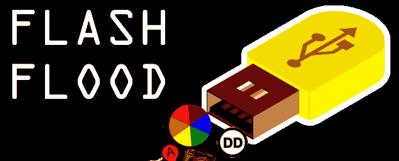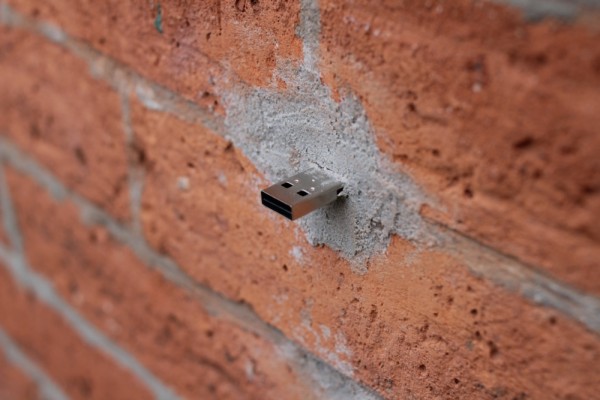
Little Berlin starts a “Flash Flood”
Philadelphia has been hit by a flood, and this time not the Hurricane Irene variety. The Little Berlin collective in North Philly has just initiated a semi-secretive project called “Flashfl00d,” in which artists, hackers and just about anyone can participate by exchanging digital data in the physical world. Based on the concept of Dead Drops, which originated with Aram Batholl’s N.Y.C. Eyebeam residency, the idea is simple on the surface: fill a USB flash drive with data and hide it in a public space. Potentially, the information could be almost anything: art, text or executable files for example. The sheer open-endedness and flexibility of the sharing is what makes it so intriguing.
The widely distributed exhibit is curated by Little Berliners Alana Bograd, Angela McQuillan, Tyler Kline, Kelani Nichole and Lee Tusman. To participate, essentially all you need is a flash drive and/or a laptop. The next step involves either adding to the peer-to-peer access points around the city (which appear as USB drives protruding from walls) or plugging into one of the locations and retrieving the stored content.
On Friday, March 2, the project kicked off in the Little Berlin gallery space ,with a sort of meeting of the minds behind the project, as well as a one-time video and sound installation called “BYOBeamer” (which itself is a project sourced from artist Rafaël Rozendaal). Artists were encouraged to bring their own projectors and equipment into the space for a collaborative installation. In all, some 18 different projectors filled the walls of the gallery with distorted pop-cultural images, abstractions, live-feed video loops and facial recognition software captures, among others. The opening itself was an entertaining participatory event, but it also provided invaluable information about the background and details of “Flashfl00d,” including a map of the initial Dead Drops. There is also a database of locations on the Dead Drops site.
In the spirit of Geocaching, the project is far-flung. Although “Flashfl00d” specifically refers to this Philadelphia manifestation, the concept is really an offline global phenomenon. When so much of our time is spent in comfortable settings staring into glowing rectangles, the idea of meshing file-sharing with street art and guerilla tactics is what really makes this concept shine. There is, of course, also a slight element of danger in that these Dead Drops could be anywhere and contain anything — including viruses if the dropper happened to be malicious.
Overall the idea is a way for curating and including all manner of individuals in a democratic and remixable open-source exhibition, which mirrors the Internet, but in the geographical world instead of the virtual one. “Flashfl00d” is literally public art hiding in plain sight. Instead of wheatpasted murals, these unobtrusive locations take street art practices for a complete 180 by introducing a profoundly hidden dimension that bridges the gap between digital and material. For both the technophiles and the Luddites among us, “Flashfl00d” peaks the curiosity of anyone interested in exchanging data through a new, exciting and versatile format.
There are a number of upcoming events associated with Little Berlin’s Dead Drop odyssey, including a night of electronics and music presented by DataGarden on March 17 from 7 to 11 p.m. and a salon of glitch and new media art entitled LiTTle GLI.TC/Hes on March 24, also from 7 to 11 p.m.
Little Berlin is located at 2430 Coral St. (but “Flashfl00d” is all over the place); [email protected].
Recent Content
-
Artsarticle ·
-
Artsarticle ·
-
Artsarticle ·


